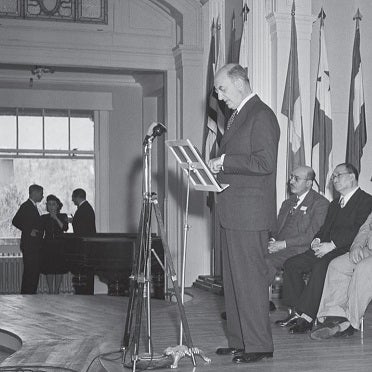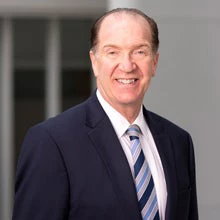 44个国家代表团的730名代表出席了布雷顿森林会议。 图为会议主席亨利·摩根索正在向与会代表们致辞。图片:©Bettmann / Getty Images
44个国家代表团的730名代表出席了布雷顿森林会议。 图为会议主席亨利·摩根索正在向与会代表们致辞。图片:©Bettmann / Getty Images
This is an excerpt of my essay that was originally published in the Bretton Woods compendium, commemorating the 75th anniversary of the Bretton Woods Conference. Read the full essay, here.
The end of the 20th century and the beginning of the 21st will go down in history as a consequential era of poverty reduction. In 1990, the World Bank published the World Development Report focused on poverty. Since that year, broad based economic growth and inclusive approaches to development reduced the number of people living in extreme poverty by more than 1.1 billion.
The poverty rate in 2018 was estimated at 8.6 percent—the lowest level in history. Despite this progress, the challenges we face remain urgent. More than 700 million people still live in extreme poverty—that is one in 12 humans alive. In sub-Saharan Africa, the number of people living in extreme poverty is on the rise, and 15 million new jobs are needed every year to keep up with population growth. Current income growth rates will not be sufficient to achieve shared prosperity and enable people to reach their full potential. Too many people are not seeing an advance in their living standards, their skills, or their ability to face natural disasters.
The World Bank Group is working to address these challenges. Over the last 75 years, the institution has grown, evolved, and supported innovation. The World Bank Group of 2019 has vastly more tools and approaches than ever before, and the focus of our work is strong country programs to drive growth, raise median incomes, and create breakthroughs that improve the lives of the poorest and most vulnerable.
These efforts are built on a foundation of the ideas and ideals that were debated, shaped, and agreed upon at an unprecedented gathering in a small town below the mountains of New Hampshire three-quarters of a century ago.
Foundation of Opportunity
On the evening of July 1, 1944, US Treasury Secretary Henry Morgenthau stood before delegates from 44 countries at the Mount Washington Hotel. Across the Atlantic Ocean, Allied armies were pushing through Normandy, battles raged in both Europe and the Pacific, and it was still uncertain who would prevail in the largest and deadliest war in history.
Long before the war’s outcome was clear, the Allied nations began looking ahead to the world beyond the war. US President Franklin Roosevelt knew that it would not be enough to shape the postwar order; he envisioned an effort to build an entirely new system that would not just prevent another world war but ensure lasting peace.
Roosevelt had learned important lessons from the aftermath of World War I, when another American president, Woodrow Wilson, argued that peace must be based on “the principle of justice to all peoples and nationalities, and their right to live on equal terms of liberty and safety with one another—whether they be strong or weak.” The 1919 Treaty of Versailles had failed, in part because economic crises helped Nazi ideology to take hold and push the world back into war. By 1944, it was clear that peace must be based not just on liberty and safety, but on opportunity and prosperity as well.
That was how the delegates found themselves in a grand but aging hotel at the foot of Mount Washington in the village of Bretton Woods, New Hampshire. The purpose of the United Nations Monetary and Financial Conference was to build an entirely new global financial system that would stabilize exchange rates, bridge imbalances of payments, rebuild countries scarred by war, and promote development in poorer parts of the world. In his opening speech, Morgenthau, the chair of the conference, said the goal was to create “a dynamic world economy, in which the people of every nation will be able to realize their potentialities in peace … to raise their own standards of living and enjoy, increasingly, the fruits of material progress.”
Over the next three weeks, the delegates huddled around conference tables and bars; they argued over meals and during late-night technical sessions. Before the month was over, they created a new global financial system and two new institutions: the International Monetary Fund and the International Bank for Reconstruction and Development—later known as the World Bank.
The new financial system incorporated key ideas that the delegates discussed on the opening night. The conference itself was based on the conviction that there are no fixed limits to prosperity—that all nations could benefit from growth and development. The system that emerged from that conference was designed to address challenges that individual countries could not tackle on their own.
And finally, underpinning the entire effort was the idea that all people deserve opportunity. “Freedom of opportunity,” Morgenthau said, “is the foundation for all other freedoms.”
And finally, underpinning the entire effort was the idea that all people deserve opportunity. “Freedom of opportunity,” Morgenthau said, “is the foundation for all other freedoms.”
Over the last 75 years, the World Bank Group’s mission has expanded and evolved, from rebuilding after conflict to alleviating poverty. But above all, the Bank has worked to harness the power of markets, inclusive economic growth, and knowledge sharing to improve the lives of the poorest and most vulnerable, a mission that is more urgent today than ever before.
Continue reading the full essay here.



Join the Conversation